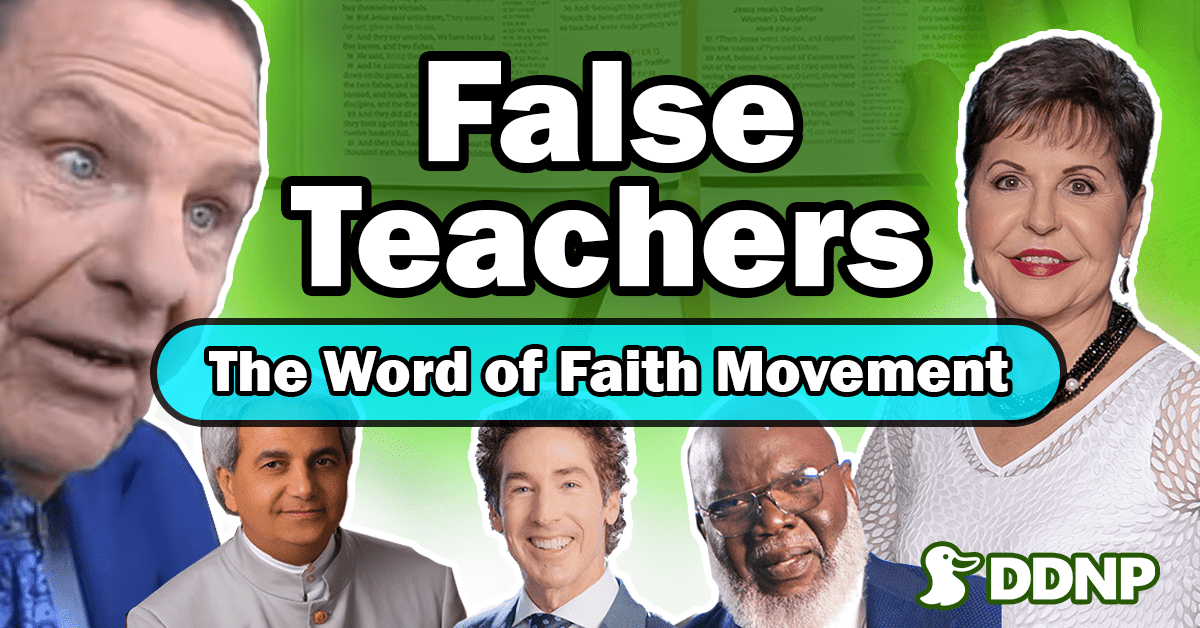
Word of Faith Movement and Prosperity Gospel: Critical Doctrine Analysis
The Word of Faith movement and prosperity gospel have become controversial within modern Christianity since the mid-20th century.
Championed by figures like Kenneth Hagin, they emphasize faith to access divine power for health, wealth, and success.
Critics argue these teachings deviate from orthodox doctrine and incorporate non-Christian philosophies such as occultism and New Thought metaphysics.
Key theological errors include extreme kenoticism, the spiritual death of Christ, and the “little gods” doctrine, which conflict with orthodox Christology and monotheism.
The movement’s New Thought influence poses significant challenges to biblical faith and church teaching.
Summary

The Word of Faith Movement and Prosperity Gospel: A Critical Examination of Doctrine and Influence
The Word of Faith movement and the prosperity gospel have become significant and controversial forces within modern Christianity since their emergence in the mid-20th century. Prominently championed by figures such as Kenneth Hagin, these doctrines emphasize faith as a means to access divine power for securing health, wealth, and success. However, they have faced substantial critique for promoting teachings that deviate from orthodox biblical doctrine and incorporate elements from non-Christian philosophies, including occultism and New Thought metaphysics. This article explores the historical background, key doctrinal errors, and theological implications associated with these movements, shedding light on how they have influenced contemporary Christian belief and practice.
Historical Background and Scriptural Analysis
The Word of Faith movement arose in the 1950s and 60s, espousing the belief that through faith-filled speech and positive confession, believers can manipulate spiritual laws to affect material realities. This concept, often summarized as "name it and claim it," teaches that Christians have the authority to claim health, wealth, and victory by speaking God's promises over their lives. Closely related, the prosperity gospel advances the notion that financial blessings and physical wellness are visible signs of God's favor and reward for faithfulness.
Critics argue that these teachings distort the biblical understanding of faith by reducing God to a means to material ends, neglecting the central Christian themes of suffering, grace, and spiritual transformation. Scriptural analysis reveals that traditional Christian doctrine emphasizes reliance on God's sovereign will rather than human manipulation of spiritual forces.
Doctrinal Errors: Extreme Kenoticism and the Spiritual Death of Christ
Among the theological concerns in the Word of Faith teaching are errors related to Christology, particularly extreme kenoticism. This view asserts that during the Incarnation, Jesus "emptied" Himself of all divine attributes, including omniscience and omnipresence, effectively limiting His divinity. Orthodox Christianity typically rejects this position because it undermines the doctrine of the hypostatic union, which holds that Jesus is fully God and fully man without diminution of His divine nature.
Another contentious doctrine is the claim that Jesus died spiritually on the cross—that He experienced a separation from God the Father. While some traditions acknowledge Jesus’ suffering in this manner as part of the atonement, others contend that it conflicts with the biblical unity within the Trinity and the inseparability of the Father, Son, and Holy Spirit.
The “Little Gods” Doctrine and Its Departure from Orthodox Monotheism
A prominent feature of the Word of Faith theology is the teaching that believers become "little gods," reflecting divine nature by participating in God's essence. This concept, popularized by figures like Kenneth Hagin, suggests a form of exaltation inconsistent with biblical monotheism. Mainstream Christian doctrine maintains a clear distinction between the Creator and the created; while Christians are called to partake in the divine nature (2 Peter 1:4), this does not imply divinity but rather sanctification and transformation by grace. The “little gods” teaching is thus regarded as heretical, blurring essential doctrinal boundaries.
Influence of New Thought Philosophy and Occultism
The philosophical underpinnings of the manifesting aspect of the Word of Faith movement are heavily influenced by the New Thought movement, which originated in the 19th century. New Thought emphasizes mental healing, positive thinking, and the capacity of the mind to shape reality through spiritual power within the individual. These metaphysical and occult roots present significant challenges when intertwined with Christian theology, as they contrast sharply with biblical descriptions of God’s sovereignty and the nature of creation.
The infiltration of occult concepts disguised within Christian terminology constitutes a syncretistic threat to the church, blending false doctrines with authentic belief. This mixture promotes a naturalistic or metaphysical worldview rather than the biblical faith grounded in grace, redemption, and divine authority.
Teaching Infiltration and the Spread of False Doctrine
The contemporary spread of the Word of Faith movement and prosperity gospel illustrates the broader challenge of teaching infiltration within the church. False doctrines that incorporate occult ideas threaten the integrity of Christian orthodoxy by distorting the gospel message. The integration of New Age influence through metaphysical concepts of manifestation opposes biblical natural theology, which understands God’s revelation through nature, Scripture, and the person of Christ.
Such doctrinal errors call for earnest discernment, theological education, and a commitment to scriptural truth among believers. Protecting the faith requires vigilance against syncretism and maintaining the purity of biblical teaching in the face of modern heresies.
Conclusion
The Word of Faith movement and related prosperity gospel teachings represent a departure from historic Christian orthodoxy through the adoption of doctrines such as the “little gods” concept, extreme kenoticism, and spiritual death of Christ, as well as by incorporating New Thought and occult philosophies. These theological errors pose significant challenges to the church’s doctrinal purity and call for careful biblical examination and resistance to false gospel teachings. Upholding authentic Christian faith demands distinguishing between biblical natural theology and metaphysical philosophies, preserving the central truths of the gospel, and guarding against the infiltration of false doctrine into the contemporary church.
Frequently Asked Questions
Q: What is the Word of Faith movement?
A: The Word of Faith movement is a Christian religious movement that emphasizes the power of faith and positive confession to bring about healing, prosperity, and success. It teaches that believers can access God's promises by speaking faith-filled words and maintaining strong belief. Originating in the mid-20th century, the movement is often associated with teachings on the power of words and the prosperity gospel. Critics sometimes challenge its interpretations of scripture and focus on material blessings.
Q: Who are the key figures in prosperity gospel?
A: Key figures in the prosperity gospel movement include televangelists and pastors such as Kenneth Copeland, Joel Osteen, Creflo Dollar, and Benny Hinn. These individuals are known for preaching that faith, positive speech, and donations to religious causes can increase one's material wealth and physical well-being. Their teachings often emphasize financial blessings and health as signs of God's favor.
Q: What is the little gods doctrine?
A: The 'little gods' doctrine refers to a theological concept suggesting that human beings can become divine or godlike in nature. This idea appears in various religious and philosophical traditions, implying that people possess a divine spark or potential to attain a godly status through spiritual development or union with the divine. It often highlights the transformative power of spirituality but is viewed differently across religions, with some accepting and others rejecting the notion as heretical.
Q: How is the New Thought movement connected to modern Christianity?
A: The New Thought movement, emerging in the 19th century, shares connections with modern Christianity through its emphasis on spiritual healing, positive thinking, and the power of belief. While it diverges from traditional Christian doctrines, it often incorporates Christian terminology and themes, such as the belief in a divine mind or God’s presence within each individual. This movement has influenced some contemporary Christian groups by encouraging a focus on personal empowerment and inner transformation alongside faith in God.
Q: What are the criticisms of Bethel Church Redding?
A: Bethel Church Redding has faced criticism primarily for its teachings and practices related to charismatic gifts, such as prophecy and healing, which some view as unorthodox or controversial within broader Christian circles. Critics also express concern about the church's emphasis on supernatural experiences, which some argue can lead to emotional manipulation or a focus away from traditional biblical doctrines. Additionally, Bethel has been scrutinized for its political stances and associations, which some perceive as divisive or inconsistent with evangelical norms. Despite these criticisms, Bethel maintains a large and dedicated following, emphasizing revival and spiritual renewal.
Key Entities
Kenneth Copeland: Kenneth Copeland is an American televangelist known for his prosperity gospel teachings and as the founder of Kenneth Copeland Ministries. He has been influential in Pentecostal and charismatic Christian circles since the 1960s.
Kenneth Hagin: Kenneth Hagin was an American preacher regarded as the father of the modern Word of Faith movement. He founded Rhema Bible Training College and emphasized faith healing and prosperity teachings.
Joel Osteen: Joel Osteen is a prominent American pastor and televangelist, leading Lakewood Church in Houston, Texas. He is known for his positive preaching style and large televised ministry outreach.
Bethel Church Redding: Bethel Church in Redding, California, is a charismatic megachurch known for its worship ministry and emphasis on supernatural gifts. It has gained international attention for its music and healing revival activities.
E.W. Kenyon: E.W. Kenyon was an early 20th-century American pastor and author whose teachings influenced the modern Word of Faith movement. His theology combined Pentecostalism with metaphysical concepts of positive confession.
External articles
Articles in same category
- 2025 Naturalization Civics Test: Harder Requirements for U.S. Citizenship Applicants
- Maine Senate Race: Progressive Ex-Marine Graham Platner’s Controversy Threatens Democrats’ Bid Against Susan Collins
- Senate Democrats Block GOP Stopgap Bill, Government Shutdown Enters 21st Day
YouTube Video
Title: Is the Word of Faith movement biblical? | GotQuestions.org
Channel: Got Questions Ministries
URL: https://www.youtube.com/watch?v=wYDwjDDel94
Published: 6 years ago
Politics